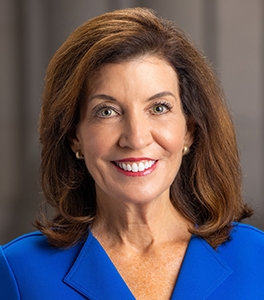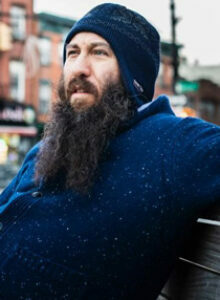Gov. Hochul’s new mental health initiative proves that there’s strength in acknowledging vulnerability – but one area of oversight is cause for concern.
New York’s last governor may have adopted the motto “New York tough,” but current Governor Kathy Hochul’s new mental health initiative is proving that there’s also strength in our vulnerability.

NYS Governor Kathy Hochul
This winter, Gov. Hochul announced a $1 billion investment in New York State’s mental health services, the largest since the 1970s, which she kicked off with a statewide listening tour on youth mental health. In June, her Youth Mental Health Summit was held at the Javits Center, a space typically reserved for auto shows and Comic Con.
In her remarks, the governor challenged more than 1,000 stakeholders – including clinicians, parents, educators, and youth themselves – to present her with out-of-the-box ideas and approaches to the youth mental health crisis.
“We’re going to challenge conventional wisdom [and] think beyond where we are today,” she told attendees, myself included. “We have to transform our approach to dealing with the youth in our communities and the challenges they face.”
Gov. Hochul likes to note that she is New York’s first governor who is also a mother – and it shows. At the summit, her parental instincts were evident in her commonsense, get-down-to-business attitude, which is infused with profound compassion and empathy. It’s all too easy to be cynical about the promises of politicians, but I, for one, am invigorated by the governor’s passion for and dedication to implementing tangible, realistic solutions. Her detailed overhaul proposal includes, for example, $30 million to expand services for school-aged children and $10 million to strengthen youth suicide prevention programs, among other critical plans across the continuum of the state’s mental health services.
As a long-time campus rabbi and a family peer advocate, I’m energized by the governor’s plans, and I believe in her ability to get it done. If New York is to make real progress in overhauling its mental health systems and services, then she is, I think, exactly the kind of leader we need.
But as a neurodivergent father of a child on the autism spectrum, I also enthusiastically accept her request to audience members that we present her with ideas to further this important work.
Though I was impressed and moved by the youth summit, something was missing. That day, I heard thoughtful, nuanced conversations about the roles that intersectional identities like race, sexual orientation, and gender identity play in youth mental health. But there was no mention of another key demographic: neurodivergent youth.
Studies shows that teens with disabilities are up to five times more likely than their peers to deal with depression and anxiety. This is especially true of young people with autism spectrum disorder, 40% of whom also have an anxiety disorder. Research also shows that the suicide risk for neurodivergent youth and adults is as much as seven times higher than that of the rest of the population.
These statistics are staggering, and they’re certainly worthy of inclusion in any and every discussion of youth mental health. Yet the summary report of the governor’s recent Youth Listening Tour makes just one passing mention of youth with disabilities – and the topic didn’t make it into a single conversation at the summit.
Gov. Hochul is right that we must make it easier for families to access the mental health resources and support their children need. But if we’re truly committed to youth mental health – for all youth – then we must also acknowledge and address the unique needs of neurodivergent youth with mental health challenges.
The fact is, we can’t fully and honestly commit to youth mental health when we’re leaving neurodivergent youth out of the conversation.
Here’s a huge example: Gov. Hochul’s overhaul plans include $13 million to expand home-based youth crisis intervention services – an incredible and much-needed expansion. Yet, by bringing neurodivergent advocates to the table during listening tours, focus groups and events like the summit, we could help create solutions to help avert some of the need for crisis intervention in the first place.
For neurodivergent kids and their families, siloed governmental processes and a lack of cross-coordination of systems leads to major gaps in access to critical care. Rules and red tape often make it all but impossible to get support from both the Office of Mental Health and the Office of People with Developmental Disabilities, even (and perhaps especially) in moments of profound crisis – something my own family found out the hard way a few years ago.
In other words, when families need help the most, they have access to it the least. And though advocates do the best we can to navigate existing systems, we don’t have the power to overhaul them.
For that, we need the help of people like Gov. Hochul – and for that, we need to consider youth with complex, intersectional needs in any plans to overhaul mental health services.
I know there are no easy solutions, and besides my constant kvetching, these conversations are being had at the highest level. But from one “dadvocate” to New York State’s first governor mom, my plea is this: If we’re serious about revamping New York’s mental health services, people with disabilities must be a major and continued part of the discussion – right from the start. Our children’s lives quite literally depend on it.
Simcha Weinstein is a best-selling author, syndicated columnist, and family peer advocate. He is the founder of the Jewish Autism Network. Named “New York’s Hippest Rabbi” by PBS, he resides in Brooklyn, New York.





